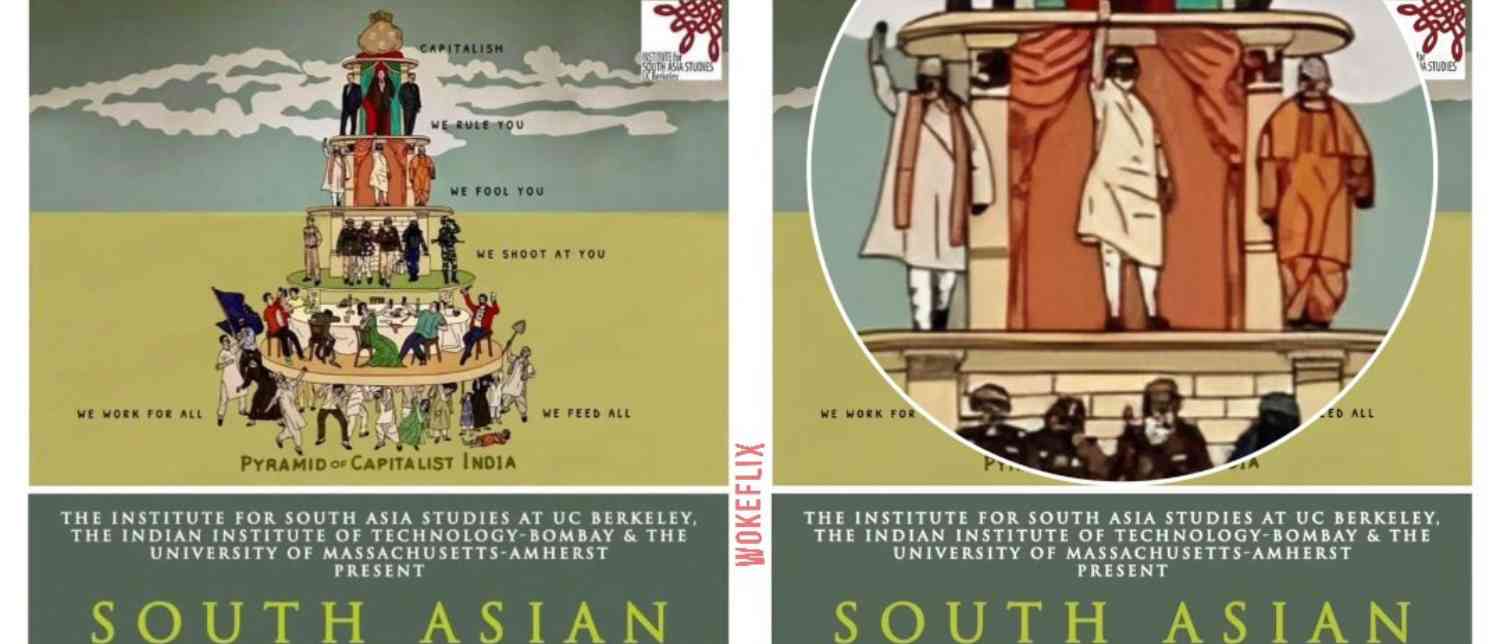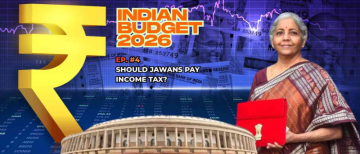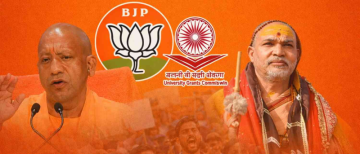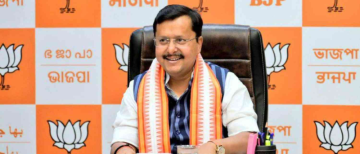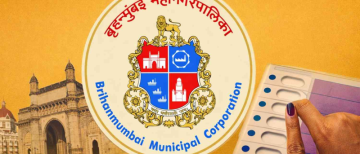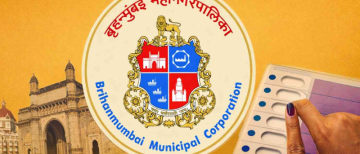The Indian Institute of Technology, Bombay (IIT-B) has found itself at the center of a major controversy after a poster linked to one of its international academic events went viral on social media. The flyer, which was circulated online without the institute’s knowledge or consent, depicted prominent Indian leaders alongside provocative captions such as “We fool you” and “We shoot you.”
The incident has triggered outrage among political commentators, alumni, and citizens, forcing IIT Bombay to issue clarifications, distance itself from the event, and announce an internal investigation.
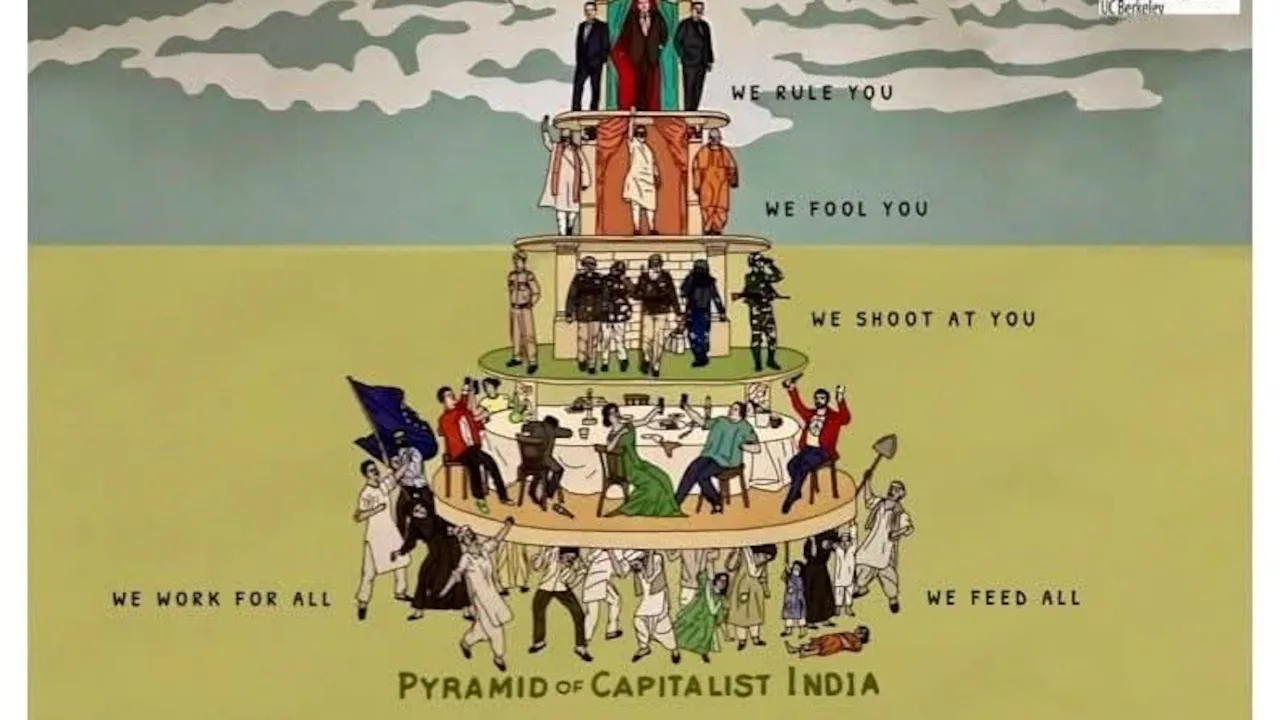
The Poster That Sparked the Storm
The flyer in question was designed for a two-day workshop titled “South Asian Capitalism(s)”, co-organized by IIT Bombay in collaboration with the University of California, Berkeley (UC Berkeley), and the University of Massachusetts Amherst (UM-Amherst). The event was scheduled for September 12–13, 2025, and aimed to explore how capitalist accumulation and social structures operate across South Asia.
What caught widespread attention, however, was the poster design. It featured a sketched image titled “Pyramid of Capitalist India”, which was based on the century-old political cartoon “Pyramid of Capitalist System,” originally published in 1911 by the Industrial Worker newspaper.
The Structure of the Pyramid
-
Top Tier: A large bag of money symbolizing wealth and capital.
-
Second Tier: Prime Minister Narendra Modi, Home Minister Amit Shah, and Uttar Pradesh Chief Minister Yogi Adityanath were placed under the caption “We Fool You.”
-
Third Tier: Depictions of the Indian Army and police appeared with the caption “We Shoot You.”
-
Base of the Pyramid: Farmers, workers, and ordinary citizens were shown as the foundation supporting the upper classes.
The imagery, coupled with the captions, immediately struck a political chord. Critics argued that it mocked elected Indian leaders, vilified security forces, and carried undertones of ideological propaganda.
Historical Inspiration: The 1911 “Pyramid of Capitalist System”
The controversial poster drew inspiration from the original 1911 caricature, which was itself modeled on earlier European and Russian political cartoons critiquing capitalism.
-
The 1911 version portrayed workers at the base supporting the entire structure. Above them were soldiers labeled “We Shoot You,” clergy labeled “We Fool You,” the wealthy elite under “We Rule You,” and finally a money bag at the top representing capital.
-
Its message was clear: capitalism thrives on the exploitation of the working class, and without workers, the system would collapse.
The IIT Bombay-linked version replaced clergy with India’s top elected leaders, which many saw as a direct political attack rather than a general critique of capitalism.
IIT Bombay sponsors an event on South Asian Capitalism.
Poster shows @AmitShah, @narendramodi, and @myogiadityanath with a caption “WE FOOL YOU”.
No Maulana or Father shown; only a Hindu Monk in saffron robes.
Why @iitbombay? @dpradhanbjp pic.twitter.com/6YzByZtXrp— Harshil (હર્ષિલ) (@MehHarshil) September 10, 2025
IIT Bombay’s Official Response
Once the flyer began circulating on social media platform X (formerly Twitter), criticism mounted rapidly. The institute quickly issued a statement emphasizing that it was completely unaware of the poster’s creation and circulation.
Key Points from IIT Bombay’s Statement
-
Lack of Involvement: IIT Bombay clarified that it had not been consulted about the flyer and was shocked by its content.
-
Immediate Action: The institute directed the organisers to remove the flyer from all social media platforms and delete IIT Bombay’s name from event materials.
-
Website Cleanup: The details of the programme were removed from the New Political Economy Initiative (NPEI) website, a project through which IIT Bombay collaborates internationally.
-
No Student Participation: The statement stressed that no IIT Bombay students were attending the event.
-
Cutting Ties: IIT Bombay declared it would cease association with the faculty members from UC Berkeley and UM-Amherst involved in the workshop.
-
Investigation: A deeper internal probe has been launched to determine how IIT Bombay’s name became associated with the flyer.
The institute reiterated:
“We were totally unaware of the published flyer. Upon hearing about this post, we issued immediate instructions to the organisers to take it down. No one from IIT Bombay is attending the conference. We are deeply shocked and upset by its content.”
The Role of the New Political Economy Initiative (NPEI)
The controversy also put the spotlight on the New Political Economy Initiative (NPEI), a collaborative platform under IIT Bombay’s Centre for Liberal Education.
-
NPEI works with international universities to host workshops, seminars, and research projects.
-
For the South Asian Capitalism(s) event, NPEI had acted as a partner, making the programme free and open to IIT Bombay students.
-
However, the institute maintained it had no role in designing or approving the controversial flyer.
By Thursday, all references to IIT Bombay were scrubbed from both the workshop’s promotional material and the NPEI website.
Online Backlash Against IIT Bombay
The incident set off a wave of criticism online, with alumni, public intellectuals, and ordinary citizens voicing their disapproval.
Alumni Reactions
-
One user, identifying as an IIT Bombay alumnus, wrote:
“Painful to see this as an alum and a donor to the institute. Does faculty at IIT Bombay think that the longest-serving PM is fooling people, and the Army is an oppressive force? Humanities departments are now adding net negative value to society.” -
Another added:
“How is this brazen depiction even acceptable? Are they going to behave like it was just a ‘coincidence’ or a ‘likeness’? This is mischievous propaganda!”
Prominent Voices
-
Aarin Capital Chairman Mohandas Pai tagged Education Minister Dharmendra Pradhan, objecting strongly after IIT Bombay blocked the X user who had first highlighted the flyer.
He argued:
“This is very very wrong. IIT Bombay is a public institution, funded by taxpayers. They cannot block any Indian citizen. Please intervene. Why are they scared of criticism?” -
Former Foreign Secretary Kanwal Sibal questioned the very premise of the event:
“Why is IIT Bombay organising an event on South Asian Capitalism(s)? There is no such thing as South Asian Capitalism(s). Do we need to be enlightened by faraway institutions like Berkeley and Amherst on capitalism in India? This seems like a political seminar with dubious intent.” -
Social media personality Monica Verma commented:
“Sitting govt leaders are being mocked with total impunity at an institution funded with taxpayers’ money, and our left-libbies tell us there is no freedom of speech.”
Criticism of Bias
Several users pointed out what they considered selective targeting in the poster:
-
“The flyer shows Modi, Shah, and Yogi with the caption ‘WE FOOL YOU.’ No Maulana or Father is depicted—only a Hindu monk in saffron robes. Why this bias against Hindu symbols?”
Others accused the organisers of misusing academic spaces to propagate political narratives under the guise of research.
Key Takeaways from the Controversy
-
Miscommunication and Oversight: The controversy highlights how a lack of oversight in academic collaborations can lead to reputational damage.
-
Sensitivity Around Political Imagery: Depicting sitting leaders and national forces in derogatory ways is bound to spark strong reactions, especially when associated with premier public institutions.
-
Global-Academic Partnerships in Question: The incident has raised concerns about how international collaborations are handled in Indian institutions, particularly when they involve politically charged subjects.
-
Public Accountability: As a taxpayer-funded institution, IIT Bombay has faced heightened scrutiny for being linked—however indirectly—to the flyer.
Moving Forward
IIT Bombay has committed to conducting a thorough investigation into the matter. It has already severed ties with the UC Berkeley and UM-Amherst faculty involved and removed all connections to the event.
Whether this will be enough to restore its image in the eyes of critics remains to be seen. The controversy also raises broader questions about the role of premier institutions in politically sensitive discussions, and the need for stringent checks to ensure neutrality in academic collaborations.
The “We Fool You” poster controversy has evolved into more than just an academic misstep. It has become a flashpoint in debates about academic freedom, political bias, and institutional responsibility. While IIT Bombay has distanced itself from the flyer and launched corrective measures, the incident underscores the delicate balance between free expression and accountability for publicly funded institutions.
As the investigation unfolds, one thing is clear: in an age of instant virality on social media, even an unapproved flyer can trigger national debate, forcing institutions to defend their credibility and integrity.
With inputs from agencies
Image Source: Multiple agencies
© Copyright 2025. All Rights Reserved. Powered by Vygr Media.

